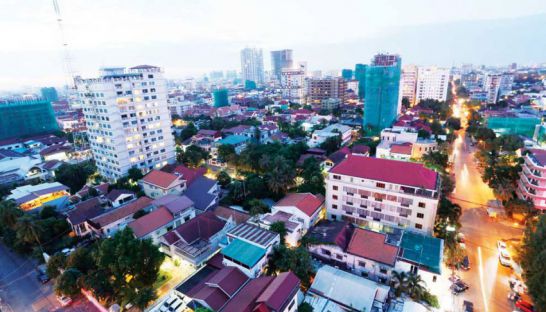Cambodia: Economy still on track: World Bank
Despite better than predicted overall growth for global economies, the World Bank has slightly downgraded its 2017 forecast for Cambodia due to wage and price concerns in the Kingdom’s the garment industry as well as uncertainty surrounding next year’s national election.
In its East Asia and Pacific Economic Update released yesterday, the World Bank predicts the Cambodian economy will grow by 6.8 percent this year, down slightly from the 6.9 percent it forecast in May. It attributed the slightly lower growth projection to the rise of “real” wages in the garment sector, declining export prices and pre-election jitters.
“Textile product exports growth decelerated to 5.4 percent year on year in the first half of 2017, compared with 8.4 percent in 2016,” the update said.
While the report was broadly positive, highlighting that concerns of an overheating credit market had been curbed as credit growth slowed to 18.2 percent by the middle of the year, compared to 25.8 percent at the same point in 2016. It noted that deposit growth remained strong, with total deposits in the banking sector increasing by 20 percent year-on-year.
The report, however, noted several downside risks including “a sharp slowdown in the Chinese economy and potential election-related uncertainty”.
Sudhir Shetty, World Bank Chief Economist for the East Asia and Pacific region, said that while he could not comment directly on concerns over the election, he suspected these uncertainties could hamper investment.
“Uncertainty is generally not seen as good for the flow of foreign investment and a worsening of the political sphere could hinder investment going forward,” he said.
Shetty explained that for Cambodia to continue its strong growth path the Kingdom’s $6.5 million garment sector would need to build on its export success by producing higher value-added products.
“There is overdependence on the garment industry with Cambodia’s export market being primarily built on garments, and clearly as wage rates rise and the US dollar appreciates against other currencies, it tends to weaken Cambodia’s competitiveness,” he said. “But the challenge for Cambodia is that within the textile industry, it needs to move up the value chain into more sophisticated products.”
Stephen Higgins, managing partner of investment firm Mekong Strategic Partners, said that Cambodia needs to take a longer-term approach that would insulate the economy from any downturn in the garment sector.
“In the longer term, Cambodia needs to shift away from the garment sector, but it can’t happen overnight because it will take many years to build up more productive sectors to compensate for a shrinking garment sector,” he said. “So if you get a meaningful slowdown in the garment sector, you’re going to see a meaningful negative impact on the broader economy.”
Miguel Eduardo Sanchez Martin, senior country economist for the World Bank in Cambodia, added that there were positive signs that Cambodia was successfully diversifying its export economy and that the deceleration of garment export growth was being partially offset by an increase in higher value-added exports.
“The good news is that there are signs of export diversification with new products being exported out of Cambodia that include some automobile, television and bicycle parts and small electrical components,” he said. “What Cambodia needs to keep on working on is remaining competitive and lowering the cost of starting a business.”
Hiroshi Suzuki, chief economist of the Business Research Institute for Cambodia, said Japanese companies operating in Cambodia’s special economic zones (SEZs) were instrumental in helping the country diversify its export basket.
“Now many Japanese companies which are producing high value-added products such as parts for automobile and/or electronics have factories in Cambodia,” he said in an email. “Although the garment sector will continue to keep an important position for at least 10 years, the effort for the diversification is very important for both the government and private sector in Cambodia.”
Cambodia is expected to tick back up to 6.9 percent growth next year, according to the World Bank report.
Source: http://www.phnompenhpost.com/business/economy-still-track-world-bank


 Thailand
Thailand




